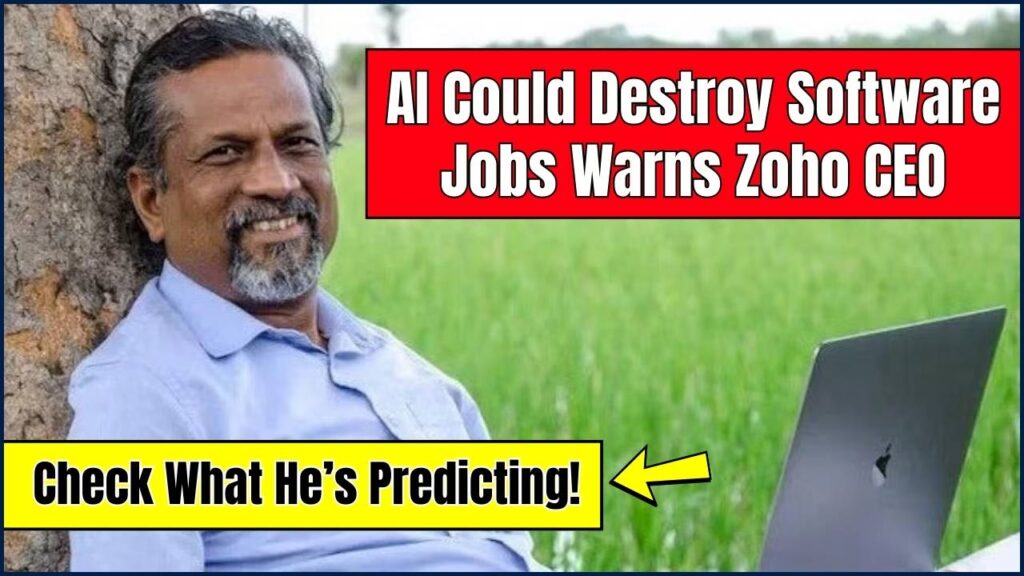AI could destroy software jobs – that’s not just a hot take. It’s a bold prediction from Sridhar Vembu, the straight-shooting CEO of Zoho Corporation, one of India’s biggest tech firms. And let me tell you, when a guy who built a billion-dollar business from scratch says AI might knock software engineers out of their high chairs, folks better pay attention.

In a recent series of statements that lit up the tech world, Vembu didn’t mince words. He said that artificial intelligence, especially large language models (LLMs) like ChatGPT, could automate up to 90% of coding tasks. That means a huge chunk of programming work could be taken over by machines. Yeah, you read that right. This warning isn’t coming from a tech outsider or a doomsday blogger—it’s coming from someone who understands how both startups and global tech ecosystems operate.
AI could destroy software jobs
| Topic | Details |
|---|---|
| Prediction | 90% of coding could be done by AI, according to Zoho CEO Sridhar Vembu |
| Main Concern | Routine or boilerplate software engineering jobs may vanish |
| Job Impact | Could result in fewer opportunities and lower salaries in tech |
| Advice to Engineers | Upskill, diversify, and focus on complex, creative tasks |
| Official Source | Economic Times Report |
Sridhar Vembu’s message might feel like a gut punch to software folks, but it’s not all doom and gloom. Yes, AI is disrupting the software world, but that just means it’s time to evolve. Instead of fighting the wave, learn to surf it. Take it as a challenge, not a curse.
Use AI to boost your productivity, get better at what humans do best, and stay open to change. Remember: the future of tech still needs people who can think, adapt, and lead. Don’t wait for change—create it.
The AI Revolution Is Here, Like It or Not
We’re in the thick of the AI revolution, and this ain’t sci-fi anymore. From GitHub Copilot writing your functions, to ChatGPT spinning out apps from plain-English prompts, AI is putting some serious pressure on traditional software roles. Tools like Google’s Gemini, Amazon’s CodeWhisperer, and OpenAI’s Codex are reshaping how code gets written.
Think about it: if an AI can write 50 lines of code in 10 seconds based on one prompt, why would a company keep paying big bucks for junior developers to do the same work over hours or even days? The equation just doesn’t add up anymore—and that’s the harsh reality the industry needs to face.
Real Stories, Real Impact
Let’s take a peek at how this plays out in the real world:
- Microsoft reportedly automates up to 30% of its coding through AI.
- A former high-paid developer earning $150K annually lost his job when his firm adopted AI to handle frontend builds and bug fixes.
- Startups are now using tools like Devin AI, which recently stunned engineers by deploying entire apps solo.
- In India, several outsourcing firms are reducing hiring targets as AI handles tasks traditionally offshored.
It’s getting wild out there. What was once a safe job in a growing industry is now on shaky ground. Even top coders are starting to wonder if they’ll be replaced by a smarter, faster AI version of themselves.
Why Is Sridhar Vembu So Worried?
Vembu’s not anti-AI. He’s been in the game long enough to know tech evolves. But he’s waving the red flag because he sees how fast this transformation is happening. According to him, software engineers are in danger of getting too comfortable, assuming that high pay and job demand will last forever.
He even quoted Intel legend Andy Grove: “Only the paranoid survive.” That’s a heavy line, but it rings true in today’s tech climate. You can’t sit back and coast on a degree or a certificate anymore. You’ve got to stay ahead of the curve.
He’s also concerned about the socioeconomic impacts. If coding becomes commoditized, will Silicon Valley salaries still make sense? Will entry-level opportunities dry up? Will tech lose its power as a tool for economic mobility?
How AI Changes the Game for Developers
The “Boilerplate” Problem
You know all that repetitive stuff in software – writing standard login forms, CRUD APIs, table schemas? AI eats that for breakfast. It’s fast, accurate, and doesn’t need coffee breaks. What once gave juniors something to cut their teeth on is now automated with a single prompt.
Speed and Scale
AI doesn’t get tired. It can write, review, and test code across time zones in minutes. A task that takes a dev team three days could be done in three hours by an LLM paired with smart tools. That shift not only impacts job security but also changes how companies budget, manage deadlines, and structure their teams.
Cost Efficiency
Companies are always hunting for leaner budgets. If they can replace five junior engineers with one senior AI operator, that’s money in the bank. From startups to Fortune 500s, the pressure to cut costs makes AI the go-to solution.
Erosion of Entry-Level Paths
Let’s be honest—everyone started somewhere. But if AI takes over the beginner-level stuff, where do aspiring developers learn the ropes? That’s a long-term concern no one has solved yet.
So What Can You Do About It?
Here comes the good part: there are ways to future-proof your tech career. Don’t panic, pivot! Being scared won’t help—but being sharp and strategic definitely will.
Step 1 – Learn AI Tools
Start using GitHub Copilot, Kite, or Replit’s Ghostwriter. Understand their strengths and limits. Make them your sidekick, not your enemy. The best coders will be the ones who know how to leverage AI, not avoid it.
Step 2 – Focus on Big-Picture Thinking
AI is great with tasks. But it sucks at strategy. Learn system architecture, design thinking, and project leadership. These human skills still matter big time. The more you understand how pieces fit together, the harder it is to replace you.
Step 3 – Go Beyond Coding
Consider blending coding with domains like healthcare, finance, robotics, or UX design. AI won’t know how to build great patient experiences or financial logic overnight. Domain knowledge will be a big differentiator.
Step 4 – Never Stop Learning
New tech pops up every week. Follow trends, take courses on Coursera, edX, or Udemy. Read arXiv papers, join forums, and stay sharp. The future belongs to those who are curious and committed.
Step 5 – Think Entrepreneurially
There’s more to tech than jobs. Think about solving real-world problems using AI. Launch your own tool, start a consulting gig, or help others integrate AI. Opportunities will explode for those who innovate.
The Broader Picture: It’s Not Just Software Jobs
According to the IMF, nearly 40% of global jobs could be affected by AI. White-collar sectors, especially in the U.S., are most at risk. That means marketing, finance, journalism – all of it is in for a shakeup. Legal assistants, customer service reps, paralegals, and even technical writers are seeing tasks shift to AI.
But here’s the kicker: in developing nations, the risk is lower for now. Why? Because many tasks are still done manually, and infrastructure doesn’t support full AI adoption yet. But it won’t stay that way forever. As tools become more accessible, the ripple effect will hit globally.
And there’s another twist: while jobs are being replaced, new roles are being created. AI auditors, prompt engineers, data labelers, LLM trainers—these weren’t real jobs a few years ago. Now, they’re in high demand.
Frequently Asked Questions About AI could destroy software jobs
Q1: Will AI take over all programming jobs? Not likely. AI will probably take over repetitive and low-level tasks, but complex software development will still need human brains for the foreseeable future.
Q2: Is learning to code still worth it? Absolutely! But don’t just learn syntax. Learn how to build systems, solve problems, and manage teams.
Q3: What programming languages are AI-proof? No language is totally AI-proof, but learning Python, Go, Rust, and SQL (for data-heavy roles) can keep you valuable in this transition.
Q4: Should I switch careers because of AI? Not unless you want to. Instead, adapt your role to include AI or tech strategy. There’s always space for humans who can manage machines.
Q5: What soft skills matter in an AI world? Communication, leadership, empathy, and adaptability. These are the skills AI can’t replicate.
Q6: Are there industries safe from AI? Nothing is totally safe, but jobs that require a human touch—like counseling, education, or care work—are less vulnerable.











